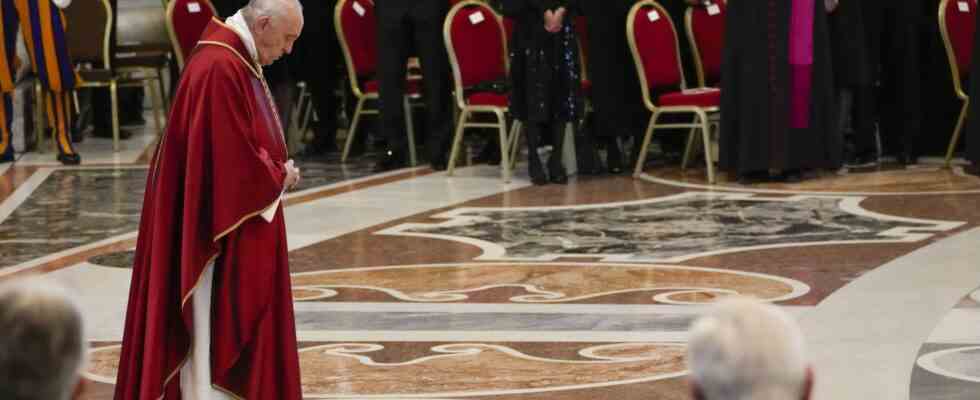As of: 04/15/2022 7:41 p.m
Pope Francis’ Good Friday rituals were determined by the war against Ukraine. In Germany, both major churches warned against resignation in the face of violence. Church leaders called for peace.
Christians around the world commemorated the crucifixion of Jesus on Good Friday. Pope Francis’ Good Friday rituals this year were marked by the war against Ukraine.
In a celebration marked by silence and seriousness, Pope Francis and around 3,500 believers commemorated the death of Jesus in St. Peter’s Basilica in Rome. At the beginning, the head of the church prayed standing still in front of the main altar. Because of his knee and hip problems, the Pope refrained from stretching out on the floor, as the liturgy intended at this point.
The Vatican’s decision to allow a Russian woman and a Ukrainian woman to carry the cross at the Stations of the Cross in Rome’s Colosseum caused anger among Ukrainians. Critics argued that this projected an image of reconciliation while Ukraine suffered from the war at the hands of Russia. The two women are friends.
The Pope had previously offered to travel to Ukraine if it would help bring about peace. He sent his almsman, the Polish Cardinal Konrad Krajewski, to the Ukrainian capital of Kyiv for a Good Friday procession. The Italian broadcaster Rai TV reported that Krajewski had visited the two places that were badly hit by the war, Bucha and Borodyanka.
War is the dominant theme in German church services
The war also determined the Good Friday services of both major churches in Germany. These warned against resignation in the face of war and violence. The suffering and death of Jesus on the cross is a parable for all suffering in the world. Cardinal Reinhard Marx called on the leaders of all Christian churches to “demand the end of violence with one voice” so that we can talk to each other. “Stop the massacres. Stop the brutality of this war,” said the Archbishop of Munich and Freising in Munich’s Liebfrauendom. “That’s why we need the unanimous voices of everyone: the Catholics, the Protestants, the Orthodox.”
Bätzing appreciates the courage of the TV editor
The chairman of the Catholic German Bishops’ Conference, Bishop Georg Bätzing of Limburg, praised the courage of TV editor Marina Owsjannikova, for example, who had protested against the war on the Russian news. “The situation reminded me of how Jesus stood before Pilate and said: ‘I was born and came into the world to bear witness to the truth,'” he said in Limburg Cathedral. And further: “All shameful attempts to suppress what is true and leads to freedom will not be successful in the long run.”
Archbishop Schick: “Jesus points out those affected”
Bamberg Archbishop Ludwig Schick explained that the crucified Jesus points to those affected by war and injustice. In addition to the situation in Ukraine, Schick recalled the people in Yemen, Syria, Sudan and Pakistan. Good Friday also raises the question of whether people can still cry, mourn and lament, the archbishop added. “We like to be cool, superior and distant. Can we cry, mourn and lament about our world, humanity and creation?”
The Bishop of Trier, Stephan Ackermann, also referred to the “Good Friday situations of our time”. In addition to the people in Ukraine, he named those who “are floating helplessly in the Mediterranean for days and finally drown without anyone ever hearing from them again”.
Criticism of the Patriarch Cyril
Munich Cardinal Reinhard Marx sharply criticized the role of the Russian Orthodox Patriarch Cyril I, without naming him directly. It is a perversion “that Christians in the sign of the cross have also exercised violence, that in the current war baptized Christians are killing other Christians and are still receiving support from church leaders”. Systems and civilizations as well as political rule built on violence could “never be legitimized by Christianity”.
Russian Orthodox Patriarch Kirill regularly expresses his closeness to Russian President Vladimir Putin and his support for his war drive against Ukraine.

